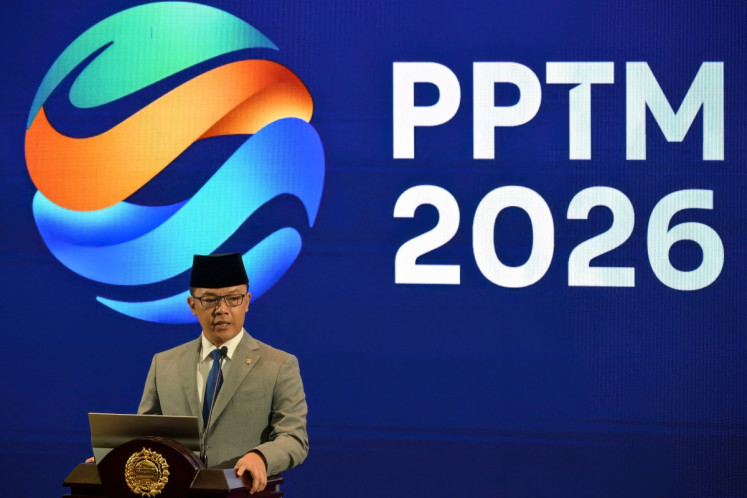Popular Reads
Top Results
Can't find what you're looking for?
View all search resultsPopular Reads
Top Results
Can't find what you're looking for?
View all search resultsTechnology provides new voice for anonymous critics
Shortly after South Jakarta District Court sentenced former tax officer Gayus H
Change text size
Gift Premium Articles
to Anyone
S
hortly after South Jakarta District Court sentenced former tax officer Gayus H. Tambunan to seven years in prison last week, the Internet was abuzz with discussions on the perceived leniency of the sentence.
Twitter and BlackBerry users were the first to react, posting a string of comments, from those supporting the sentence to those criticizing and making jokes about the trial as a blatant example of justice for sale and the lack of law and order in the country.
There were many allusions to the now infamous photos of Gayus wearing a mop-haired wig and black-rimmed glasses while attending a tennis match in Bali when he was supposed to be behind bars.
“Seven years without the horrifying wig and glasses”, “Seven years but he can travel anywhere right?” “The wig was his savior” were some of the comments being posted.
The controversial case has also sparked a creative outburst and a race between Internet users to crop a picture of Gayus’ face onto as many different characters as possible, with each new collage attempting to be wittier than the other.
Meanwhile the previously unknown Bona Paputungan penned and sang Andai Aku Jadi Gayus (If I was Gayus), which went viral on YouTube.
Francisco Budi Hardiman, a political philosophy professor at the Jakarta-based Driyarkara School of Philosophy, said Sunday that the jokes, parodies and ironic comments on the Internet were open criticism of the government’s perceived failure to uphold justice.
“New technologies provide new media through which people find an easier — and faster — way to communicate, to utter their opinion freely. It’s the democratization of information if you will,” he told The Jakarta Post on Sunday.
Budi, however, said the intensive and extensive use of new media was not caused by a failure of other conventional communication tools in providing the same service.
“Face-to-face conversations, television and newspaper still exist and are used by people to communicate. New media just provides more ways of communicating,” he said.
University of Indonesia professor of literary and cultural studies Melani Budianta said that the fact that people were more “noisy and outspoken” in the virtual world did not necessarily mean they were being more critical.
“People have always been critical of the government, but traditional media was never an easily accessible platform for them. For example, bloggers and Twitter users are detached from any social burden they would face if they wrote an opinion in a newspaper,” Melani told the Post.
Both experts agreed that although Internet discussions often descended into trivial gossiping or fruitless anger-fueled diatribes, they did have the potential to mobilize people in the real world.
“We have seen examples of this: the Coins for Prita movement or the massive support for the Corruption Eradication Commission [KPK],” Budi said.
Coins for Prita was a group that formed in 2009 to raise money for a housewife who was imprisoned and fined Rp 204 million (US$22,700) for allegedly defaming a hospital through complaints of poor services.
Also in 2009, more than one million Facebook users joined a page to express support for embattled KPK deputy chairmen Bibit Samad Rianto and Chandra M. Hamzah in just nine days.
Bibit and Chandra were charged with abuse of power for imposing and then lifting a travel ban on graft suspects, receiving bribes and extorting money. The investigation into their case was later stopped.
Budi added that criticism delivered through new media was still only effective if those criticized had the sensitivity or willingness to be criticized.
“But I bid the government officials a fair warning: The Internet has been known to spark mass movements, so be careful,” he said.










